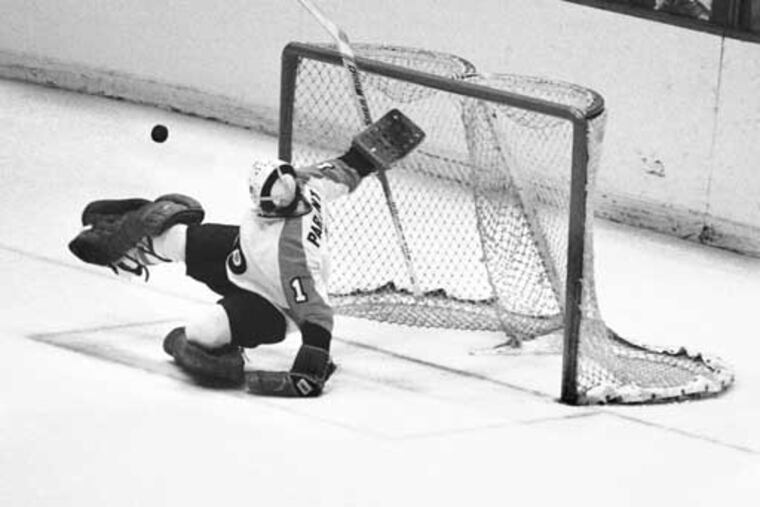Flyers flashback: Islanders can’t deny Rick MacLeish or Kate Smith
In Game 7 of the 1975 Stanley Cup semifinals at the Spectrum, the Islanders were trying to win consecutive series after losing the first three games. After meeting with the Flyers' good-luck charm, Kate Smith, and trying to get some of her magic, the Isles never had a chance.

This is the fifth in a series counting down the 10 most memorable playoff wins in the Flyers’ history. Today: No. 6.
The Flyers were coasting to the Stanley Cup Final in 1975 and then, suddenly, they were sweating.
Profusely?
“Not really,” right winger Reggie Leach recalled earlier this month. “We were going home for Game 7, and we were pretty dominating at home.”
After winning the first three semifinal games against the New York Islanders, the Flyers lost three in a row to set up a decisive Game 7 at the Spectrum.
Making matters worse, from the Flyers’ perspective: The Islanders had been there, done that. They had lost the first three games of their previous playoff series, then won four straight and stunned the Pittsburgh Penguins.
Now they were on the verge of doing the same thing to the defending Stanley Cup champion Flyers.
“We’ve got them right where we want them,” Islanders coach Al Arbour told his team before Game 7.
But just to feel more comfortable with their situation, the Islanders skated over to Kate Smith after she sang “God Bless America” before the deciding game at the Spectrum.
Smith, of course, was the Flyers’ good-luck charm, and this was the third of just four in-person appearances she would make at a game.
Eddie Westfall, the Isles’ veteran captain, presented Smith with a bouquet of chrysanthemums and kissed her cheek near New York goalie Glenn “Chico” Resch’s crease. As the fans booed, the rest of Westfall’s teammates then took turns shaking hands with the singer before the opening faceoff.
The gamesmanship didn’t work.
Just 19 seconds into the game, right winger Gary Dornhoefer scored, setting the tone for a 4-1 win that sent the Flyers to the Stanley Cup Final for the second straight season. A little over two minutes later, Rick MacLeish deposited the first goal of his hat trick.
Dornhoefer was a gritty player who scored most of his goals by his hard work in front of the net. This one, scored after Jimmy Watson forced Westfall into a turnover on the game’s opening shift, was different.
“I was just over the blue line and I let a slap shot go,” he said of a drive that beat Resch, a rookie who after the game said he “lost concentration” because Smith had spent so much time on the ice and had taken him out of his routine. “My shot wasn’t that hard.”
Years later, Dornhoefer told the good-natured Resch “it was probably the hardest shot he ever had to face." Pause. "It was a total lie.”
The Flyers won the first two games of the series without standout goalie Bernie Parent. Backup goaltender Wayne Stephenson was forced to replace him.
“I was actually responsible for Bernie being out of the lineup because during [Game 1] warm-ups, I hit him just above the knee with a shot, and somehow with the way he went to make the save, it opened a space there,” Dornhoefer said earlier this month from his home in Dover, Del.
The Flyers outshot the Isles, 35-15. MacLeish (eight), who iced the win with an empty-net goal, and Leach (seven) combined for as many shots as the entire Islanders team.
With the win, the Flyers were headed to the Final, where they would defeat Buffalo in six games and capture their second straight Cup.
Like when they won their first Cup in 1974, MacLeish was spectacular in their second consecutive championship run. He had 13 goals and 22 points in 17 playoff games in 1974. In the ’75 playoffs, MacLeish had 11 goals, 20 points, and a staggering plus-17 rating in 17 games.
MacLeish was the NHL’s leading playoff scorer in both of those years. He excelled on a line with Dornhoefer and Ross Lonsberry.
“Ricky was so good, he could carry both Ross and I,” Dornhoefer said. “He probably had one of the best wrist shots in the league. Just give him a corner and a foot or half a foot and he’d put it in. Ross and I did everything we could just to get him the puck.”
Dornhoefer remembers MacLeish dominating practices and making it look easy.
“We did drills where you’d start at your own blue line and come back, red line and back, far blue line and back,” he said. “Effortlessly, he would just glide out there and, meanwhile, Ross and I are chugging like crazy and we still couldn’t keep up with him.”
MacLeish died in 2016 at 66, and Lonsberry in 2014 at 67.
MacLeish was a smooth skater and a goal machine, Lonsberry was a strong defender and dependable scorer who controlled the corners, and Dornhoefer was dominant in front of the net, where he created havoc for goaltenders.
“As a line, I think we all added something that complemented each other,” Dornhoefer said. “And I’ve lost both of them. They won’t be forgotten, that’s for sure.”